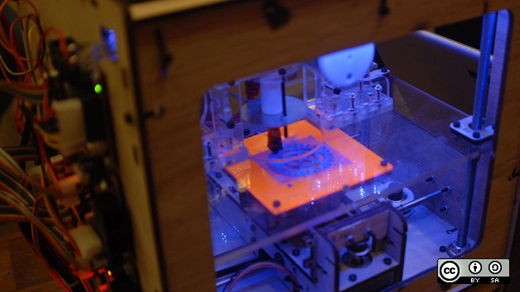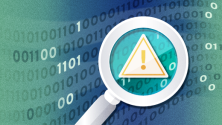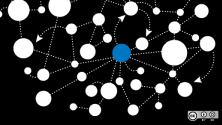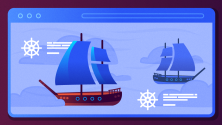Schuyler St. Leger is one of the superheroes of the maker movement. He's a speaker, young maker, and was featured in Make magazine. His famous presentation, Why I love my 3-D Printer has received over 300,000 views on YouTube.
Schuyler is keynoting at SCaLE 14x, where he'll talk about open source radio and how it's impacting the world around us. We're surrounded by radios in smartphones, tablets, laptops, and Wi-Fi access points, yet we often fail to realize their ubiquitous presence. The airwaves are a fantastic space for exploration, but where do we begin? Open source radio combined with open hardware is a rich space for exploration and experimentation.
Schuyler's session at SCaLE 14x will highlight the use of open source software defined radio tools with a live presentation. I recently had a chance to talk to him about the maker movement, open source radio, and his keynote.

How did you get into in making things? What person or project really got the ball rolling for you?
For as long as I can remember I have been interested in taking things apart, learning how they work, and sometimes putting them back together. I was first introduced to making when my mom brought home a copy of Make magazine. The magazine was amazing, and I read it from cover to cover. From there I learned about Arduino, programming, electronics, 3D printing, and so much more. The maker community and the folks at Make (now MakerMedia) are terrific. They are incredibly friendly, open, and accessible, always trying to help people learn how to make things.
The first project I made (that I can remember) was a motion-activated alarm. It had an IR motion sensor and a buzzer connected to an Arduino. I put the entire project inside an old baby wipes box and placed it next to the hallway leading from our garage. Whenever someone walked by, it made a noise. It drove my dad nuts for a while, hearing the beeping each time he walked by but being unable to identify the source. What a fun little prank that was.
What are the first steps someone could take to get started in software defined radio for Linux?
Any new learning venture starts out with curiosity and a desire to know more, more about how something works or about that something itself. For me, I came across SDR during some online reading. Wikipedia is always a fantastic starting point for nearly anything! Using the Internet to research SDR and learn about both hardware and software will provide a great foundation.
The next step is to acquire (beg, borrow, but preferably don't steal) a SDR hardware platform. The RTL-SDR USB dongle is a great platform to get started on. Next, install GNURadio (signal processing tool), GrOsmoSDR (provides a standard interface in GNURadio to interface with SDR hardware), libRTLSDR (the hardware interface driver for the RTL-SDR dongle), and Gqrx (to browse the spectrum). I should add that I've given several introduction to SDR talks that provide an easy tutorial for getting started. From here, it's really just about playing around with the software and seeing what's out there on the RF spectrum!
What is it about open source radio that interests you the most?
Software defined radio interests me because of the possibilities it opens up. SDR makes exploring the RF spectrum much less expensive, significantly lowering the barrier to entry. It also enables more research into RF communications systems. The fact that there are many open source hardware and software projects that focus on SDR make it really accessible and affordable and also provides dynamic communities around these projects. Those communities are great for getting answers to questions or meeting like-minded people.
Software is very important to SDR because all of the processing is done in software. I am a proponent of open source because sharing your work helps with innovation and helps other people learn. Open source radio is a natural extension of open source and SDR.
Do you have a mentor? Are you a mentor to others?
I do not have mentor per se, but many people have helped guide and educate me along my many paths of inquiry. Jacob Rosenthal helped me with Arduino and 3D printing when I was first getting started. Jasper Nance taught me about scanning electron microscopes (SEMs) and high speed, stop-action photography. Arizona State University professor Mark Spano helped me learn C and taught me about advanced mathematics. Michael Ossmann, Dominic Spill, and Russ Handorf all have helped me learn software defined radio.
The first open source software project I contributed to was RoboPaint working with James Todd. All of these people (and many more... ask me about Steve Wozniak some time) have helped me expand my knowledge and learn new skills. I'm forever grateful to them. I should also add that I'm grateful to the people I've yet to meet who will help in other ways. Thanks to all of you in advance! (Side note: I hope to get to spend some time with Mark Shuttleworth and Cory Doctorow while at SCaLE. I'm sure there's much I can learn from these two!)
As far as mentoring others, I lead the software development team on my FIRST Robotics team (Team CAUTION Robotics, team #1492). I also enjoy working with my younger sister and brother, giving them advice on their projects. My younger brother is on a FIRST LEGO League team. Both of them have started to learn to program from Code.org. It's inspiring.
What do you think makes a good mentor for young people? How has helping someone else helped you to become a better maker?
Someone that you can look up to and who inspires you as the person you want to be makes a good mentor for young people. Helping someone else learn a new skill or finish a project feels good, and it is quite satisfying as you will end up learning something yourself from that experience as well.
Do you regularly go to a local maker lab or makerspace?
I try to go to HeatSync Labs, my local makerspace, at least once a month. A makerspace is great not just because of the tools that are there, but the people. The people at a makerspace are an amazing resource. They can help you with almost anything.
How do you license your work? What guidelines for licensing do you recommend to others?
I use the MIT license for my code because it is simple and practical. For someone who is choosing a license, I would recommend choosing one that you understand and agree with. Spend some time learning about the various licensing options online. I would recommend choosealicense.com (helps you choose a license) and tldrlegal.com (provides details about a particular license). Both are great license information resources.
You have said, "Kids don't know what they can't do." How important is that concept to your continued explorations and inventions? Do you think that is an important concept for people of all ages?
Kids are incredibly creative and imaginative. Because kids don't know what they can't do, they will try things that an adult would say is impossible. Kids have an innate curiosity and a thirst for learning; I hope I never loose that. Adults should ask "How can I?" instead of "Why can't I?".
There's one more thing I'd add: my motto is "Don't be afraid to break something." I see adults are often hesitant because they worry about something bad happening. Well, let it happen! You will learn much more from fixing something that broke than from never attempting a project in the first place.







Comments are closed.